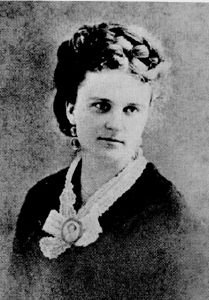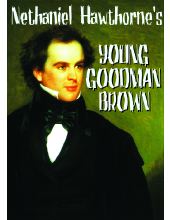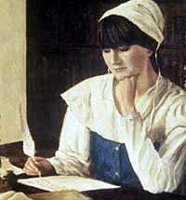The First Thanksgiving Dinner
Since the holiday season is in full
swing, and we just returned from a lovely Thanksgiving break, I decided to do
my library research on The First
Thanksgiving Dinner By Clifford Howard’s “ The Ladies’ Home Journal”
(1889-1907). It is crazy to think that in the autumn of 1621, in this new
mysterious land of Plymouth, the Pilgrim’s celebrated the first Thanksgiving.
. Did the Pilgrim’s know during
their Thanksgiving that they were starting a tradition and creating a holiday
that would be celebrated for hundreds of years?
The Pilgrims landed in Plymouth in December of 1620. It was a
hard first winter for the brave men, women, and children who took the journey
on the Mayflower. The elements were against them and many were struck with
illness and starvation due to insufficient food- “within the next three months
forty-six of their number- nearly one half of the entire party- perished. The
undying faith of the Pilgrims is what got those who remained, through the
winter, and come spring they were able to regain their strength and go on with
their work and their purpose.
“ALWAYS ready to acknowledge the mercies
of God the Pilgrims looked upon their life during the ensuing months as a happy
and prosperous one”. The Pilgrims were grateful and thankful for surviving the
harsh winter, and they were thankful that with the spring God had brought them
happy and prosperous months. The Pilgrims were so thankful that the Governor
“appointed a feast of Thanksgiving”. “Gunners were sent into the woods for wild
turkeys, which abounded there in great numbers; kitchens were made ready for
preparing the feast… while a messenger was dispatched to invite Massasoit, the
chief of the friendly tribe, to attend the celebration.” I always wondered why
turkey was such a tradition in a thanksgiving meal, because they were plentiful
in the woods of Plymouth seems reason enough to me. Also, The first Thanksgiving lasted not only on that
Thursday in November but also the two succeeding days. At first I was a little
upset that that part of the first Thanksgiving tradition didn’t carry over, but
then I realized that every day is a day to give thanks which is exactly the
point that the Pilgrims were trying to make (and there are always left overs). “Generations
to come shall look back to this hour and these scenes of agonizing trial, this
day of small things, and say: ‘Here was our beginning as a people. These were
our fathers. Through their trials we inherit our blessing.’” So I guess to
answer my above question, the Pilgrims did somehow know that their first
Thanksgiving would be the start of a tradition that would go on for hundreds of
years where people would celebrate their thanks for there is so much to be
thankful for.
My
favorite part of Thanksgiving, minus the gathering of family and friends, is
the tradition. For example, it is tradition in my family for my mom and I to
cook special dishes from both sides of the family. Each year my mom and I cook
homemade noodles in honor of my Mamaw, my dad’s mom. We also bake two pies, a
peanut butter pie and a sugar cream pie, in honor of my mom’s parents. My mom
and I also cook our very own dishes that have become staples in our family’s
traditional Thanksgiving meal over the years. There were so many things to be
thankful for this Thanksgiving and there are so many reasons to be thankful
each day.
·
What
are some of your family traditions?
·
Do
you celebrate with friends or with your extended family?
Source:
http://search.proquest.com/americanperiodicals/docview/137012479/13AA5D9B9606AFA0625/1?accountid=7090










